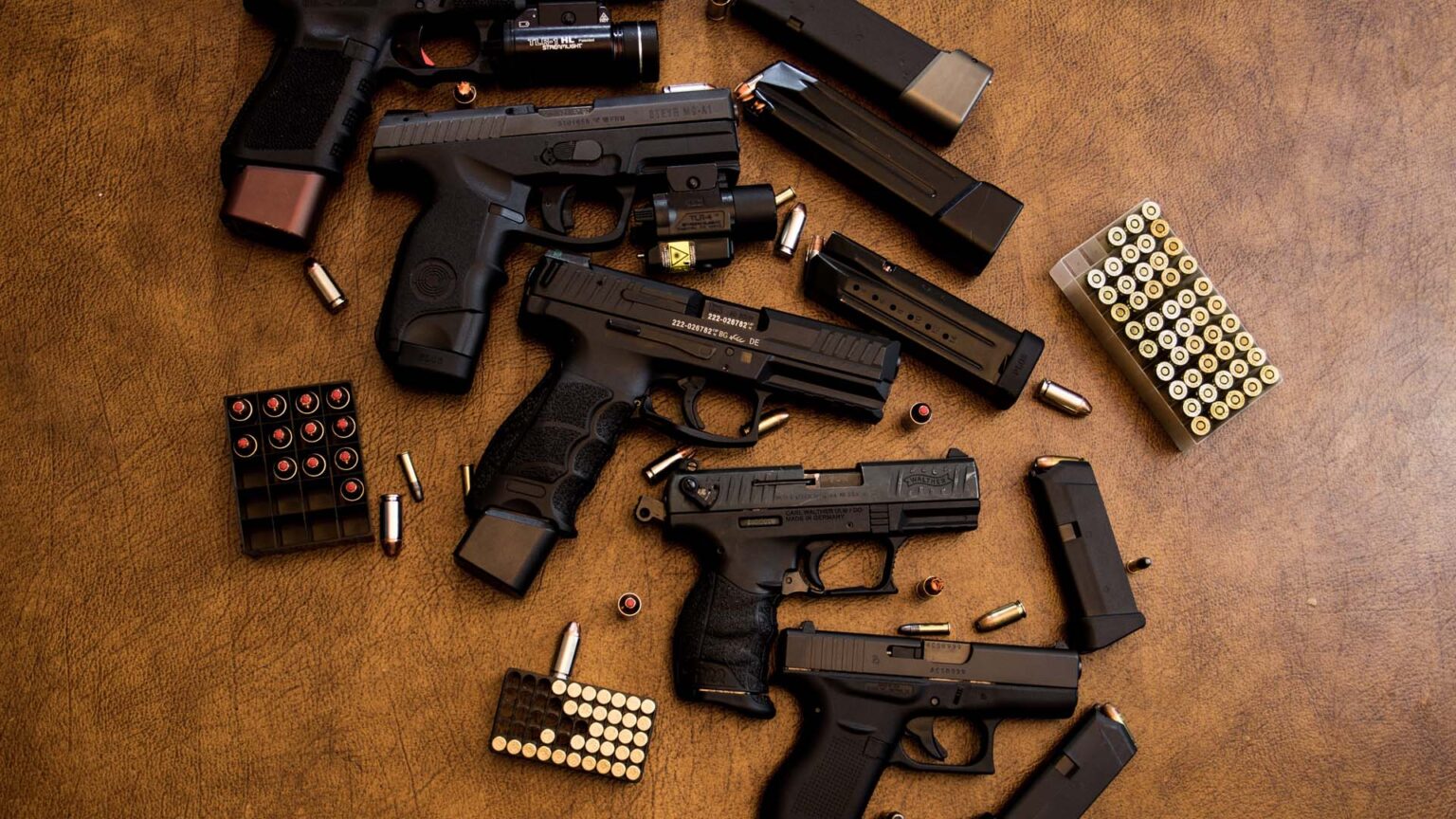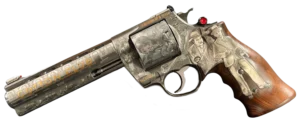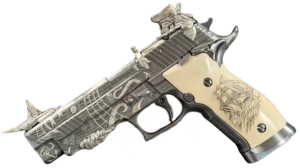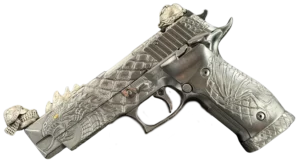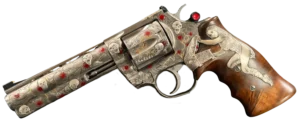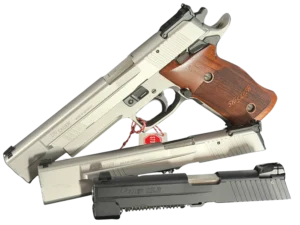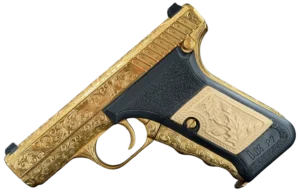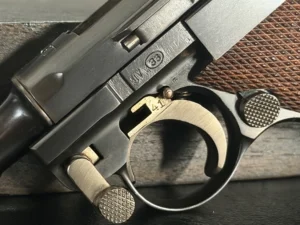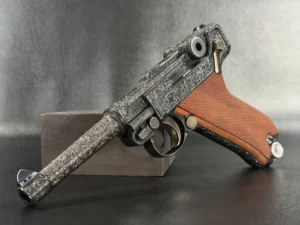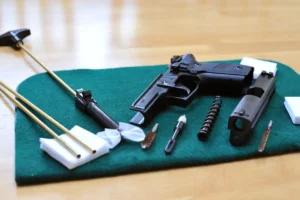Key Takeaway:
- Not all guns are good investments — and that’s okay: Some firearms hold their value or even appreciate, especially if they’re rare, well-maintained, or tied to history. But plenty of others? They’ll lose value the second they leave the store. Buy what you like, understand the market, and don’t assume every gun is a retirement plan.
- Condition, originality, and story matter more than you think: Collectors love clean guns with all the original parts and a solid backstory. Scratched finishes, aftermarket parts, or missing boxes? That’s money off the top. Want to protect value? Store it properly, clean it regularly, and avoid swapping parts unnecessarily.
- The market’s weird — and constantly changing: What’s hot today might be forgotten next year. Legal shifts, cultural moments (hello, Hollywood), and online buzz can all swing resale prices. Stay curious, pay attention, and don’t assume the market will wait for you to catch up.
So, here’s a question that comes up more often than you’d think—especially if you’ve got a safe full of old shooters or you’re eyeing a new piece at the gun shop:
Do guns hold their value?
The short answer? Sometimes. The long answer? Well… let’s say it’s complicated. Because like any market that blends utility, history, and a bit of mystique, the value of a gun isn’t just about what it can do—it’s about what it means, where it’s been, and, yeah, how shiny it still is.
This isn’t just about collectors with velvet-lined display cases, either. Whether you’re holding onto granddad’s .22 or thinking about flipping that barely-fired 1911 you panic-bought in 2020, it’s worth understanding what drives value in the used gun market—and what might tank it faster than you can say “aftermarket trigger job.”
Let’s get into it.
The Wild World of Gun Resale
The resale market for firearms is a peculiar phenomenon. It’s not quite like cars, not quite like baseball cards, and not exactly like watches either, though it has shades of all three. It’s a space where history rubs shoulders with utility, and where laws, scarcity, and even pop culture can swing prices like a pendulum.
Right now, a few trends are worth keeping an eye on:
- There’s a growing appetite for antique and collectible guns—especially among younger collectors with cash to spend.
- Legal shifts (both local and federal) are causing fluctuations in availability, which is pushing prices in unexpected directions.
- Online gun marketplaces, forums, and auctions are reshaping how people discover and assign value to firearms.
The TL;DR? The market’s always moving. If you’re in it, even passively, you’ve gotta stay awake.
What Makes a Gun Hold (or Lose) Its Value?
Okay, so let’s say you’ve got a few guns and you’re wondering what they’re worth—or if buying that limited-run revolver will pay off someday.
There are a handful of core factors that usually determine whether a gun holds its value, drops like a rock, or—if you’re lucky—shoots up in price over time.
Here’s what matters:
1. Brand Name and Demand
Let’s not pretend it doesn’t matter. A Colt, a SIG Sauer, or a Heckler & Koch is gonna raise more eyebrows (and command more dollars) than something from a lesser-known brand—even if the actual performance is similar.
People buy names. It’s that simple.
And demand? Oh yeah, huge. If the gun you’re holding is trending—because of a movie, a YouTube review, or even some weird social media buzz—you can often get more for it than you probably should.
But watch out: tastes change. A gun that was “hot” five years ago might be cold now.
2. Rarity and Backstory
You know how some guitars sell for six figures just because Hendrix touched them once? Guns have their version of that, too.
- Limited-run models.
- Discontinued series.
- Service pistols are used in specific conflicts.
- Guns with a paper trail tied to someone famous (or infamous).
The rarer and more interesting the story, the better the value. But keep in mind—this is where things get murky. Without documentation, “used by a Vietnam sniper” becomes just another fish tale.
3. Condition (and Don’t Lie to Yourself)
Look, we all want to believe our guns are in great shape. But unless you’ve been religious about cleaning, oiling, and storing them in a climate-controlled vault, chances are, there’s some wear.
Scratches, finish wear, rust, mismatched serials, replaced parts—it all eats into value. Sometimes, even just swapping grips can save a few bucks. Collectors get real fussy about “original condition,” even if that includes a bit of honest wear.
Bottom line? The better you’ve cared for it, the better it’ll care for your wallet later.
4. Original Parts and No Weird Mods
You know that tricked-out AR with the aftermarket bolt carrier group, muzzle brake, custom Cerakote, and tactical cupholder?
Yeah… probably not worth what you think it is.
Customizations might make a gun better for you, but they usually make it less valuable to someone else. The original factory configuration (and accessories, if you’ve them) will almost always fetch a higher price.
So, How Do You Know What Your Gun’s Worth?
This part gets a little tricky. You’ve got two main options: do it yourself, or call in a pro.
The DIY Route
If you’re going this way, start with a few basics:
- Condition: Be honest about dings, rust, wear, etc.
- Make/Model/Serial: Nail down exactly what variant you have.
- Comparables: Research auction sites, gun forums, and online marketplaces to identify similar listings.
Sites like GunBroker, Rock Island Auctions, and Blue Book of Gun Values can give you a ballpark. But remember—asking prices aren’t selling prices. Check the “sold” listings if you can.
Also, be aware of regional price fluctuations. A gun that sells for $1,000 in Texas might go for $1,300 in New York—or $800 in Montana.
Or… Hire an Appraiser
Sometimes, especially with older or rarer pieces, it’s worth bringing in a professional. A good appraiser will look at provenance, market trends, and condition with a sharp eye—and give you a written value you can take to the bank (or the auction house).
Downside? It costs money. Upside? Peace of mind.
Selling: Trade-In vs. Private Sale
Now that you’ve a value range in your head, how do you sell the thing?
Trade-In: Easy, but Not Lucrative
Most local gun shops will give you a trade-in offer. It’s quick, legal, and often lets you roll the value into a new purchase. But you’re usually leaving money on the table—dealers need their margin, and they’ll frequently give you 60–70% of what the gun might be worth.
Private Sale: More Work, More Money
Selling privately—through a legal in-state transaction or an online platform—can net you a much better return. But it takes work.
You’ve gotta:
- Know your state laws (some places require an FFL transfer).
- Vet buyers.
- Create listings, take high-quality photos, write detailed descriptions, and respond to questions.
It can be a hassle. But if you’re selling something valuable, it might be worth the effort.
Are Guns a Good Investment?
This is the part where some people will say yes, and others will say you’re better off buying stocks or crypto.
The truth? Guns can be a solid investment—but only under the right circumstances.
You want:
- A respected brand.
- Limited or discontinued production.
- Excellent condition and original parts.
- Something tied to history or culture.
- And—this is key—patience.
This is not a “flip in 6 months for 20% profit” situation. But if you buy smart, maintain the gun, and hold onto it for the long haul, yeah—some firearms appreciate quite nicely.
That said, don’t bet the farm on it. Not every Glock is gonna become a collectible.
Modern vs. Antique: Two Different Games
Modern Guns
These are often easier to price. They’re still being made, they have active markets, and demand is usually stable (especially for brands like SIG, Beretta, CZ, HK, etc.).
Used, well-maintained models typically retain around 70–90% of their original value. Sometimes more, if discontinued or in high demand.
Antique Guns
These are trickier. Some are literal museum pieces. Others are just old. The difference is all in the details—markings, provenance, condition, and the stories behind them.
When they hit, they hit big. But misjudge it, and you might be holding onto a glorified paperweight.
Cultural Cachet Counts (Even If It Shouldn’t)
It’s weird, but accurate—guns that show up in movies or video games often see a bump in demand. Think Desert Eagles post-Matrix. Or lever actions, as seen in Red Dead Redemption. Or pretty much anything that James Bond touches.
Cultural coolness isn’t always logical, but it does move prices. So if your gun gets a sudden pop of screen time, check the market—it might be the perfect moment to sell.
Want to Keep Value? Treat It Right.
Some simple things make a big difference. If you care about preserving value, don’t treat your gun like a hammer.
Here’s what helps:
- Store it right – in a cool, dry place. Desiccants in the safe. Avoid the attic or basement.
- Clean it regularly – especially after shooting. Powder residue and rust are value-killers.
- Keep the box and paperwork – including manuals, factory test targets, and original grips —as these all boost value.
- Don’t mess with it too much – No DIY stippling jobs unless you plan to keep it forever.
- Document ownership and history – If it’s collectible, a solid paper trail matters.
Basically, treat it like something you might want to sell one day, because you never know.
Final Thoughts
Look, not every gun is a gold mine. Some lose value. Some hold steady. A few—if you play your cards right—might surprise you.
But whether you’re collecting, trading, or just being a little more intentional with your purchases, understanding what drives value in firearms gives you a real edge.
And if you’ve ever wondered whether that old revolver in your safe is worth keeping, maybe now you’ve got a better sense of the answer.
Spoiler: if it still makes you smile when you rack the slide or pull the trigger… It’s probably worth something.
Even if it never hits the auction block.
Frequently Asked Questions
Some do. Some don’t. High-end, well-maintained, or collectible models from respected brands can retain or even appreciate in value. But your everyday budget pistol? It’s probably gonna lose value like a used car. Sorry.
A mix of things: brand reputation, condition, rarity, whether it has all the original parts, and even pop culture stuff (yes, really). Also, how well you’ve taken care of it over the years makes a bigger difference than people think.
Generally, yes. What you think makes your gun cooler—custom grips, aftermarket internals, Cerakote in “zombie green”—might make it less desirable to someone else. The original usually sells better. Always has.
Start by comparing similar models online, such as GunBroker, auction sites, and forums. However, remember that the “asking price” isn’t the same as the “selling price.” For the most accurate number, get a pro appraisal (especially for antiques or rare models).
Trade-ins are easier and faster, but you’ll get less—shops need to make a profit. Private sales typically generate more cash but require more effort (and legal responsibility). If you’re selling something valuable, it’s worth investing the time and effort.


